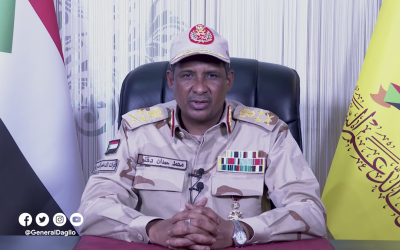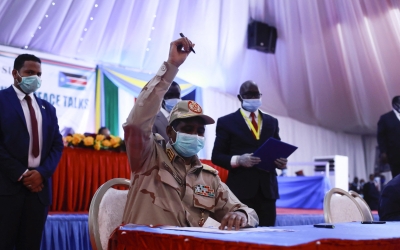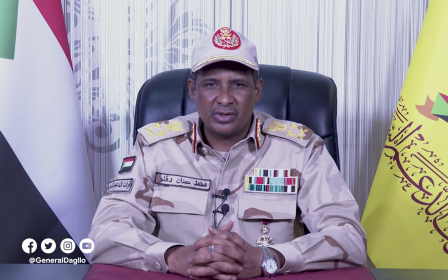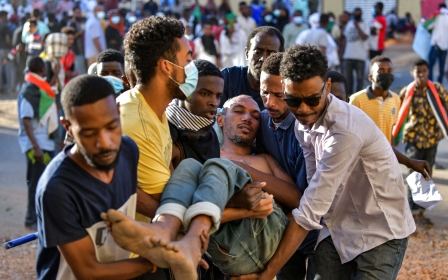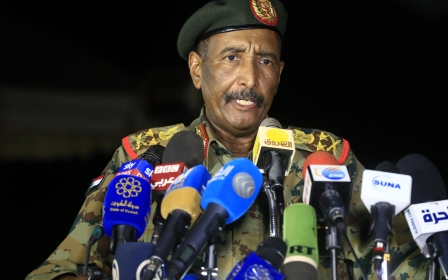Sudan: Hemeti offers reminder of military's power with border threat to Europe

Sudanese military leader General Mohamed Hamdan Dagalo, widely known as Hemeti, has told the United States and European Union his country can cause the world a “big problem” by opening its borders.
The warning was delivered in an interview with Politico on Wednesday, as the commander of the powerful Rapid Support Forces (RSF) militia told western nations they could face an influx of migrants from Africa if they didn’t support the post-coup military administration in Sudan.
“Because of our commitment to the international community and the law, we are keeping these people together,” Hemeti said, speaking via video-call from Khartoum. “If Sudan will open the border, a big problem will happen worldwide.”
Deputy to Sudanese army general and de facto head of state Abdel Fattah al-Burhan, Hemeti was leader of the notorious Janjaweed militias held partly responsible for the systematic mass killing of people in Darfur, accusations he describes in the Politico interview as "fake news".
The RSF grew out of the Janjaweed, and Hemeti now holds vast amounts of power and wealth from his position as the leader of the militia, controlling gold mines in Darfur and enjoying the patronage of rulers in the UAE and Saudi Arabia.
The power enjoyed by the RSF extends to an involvement, along with Sudan’s army and intelligence services, with people-smuggling networks and the control of Sudan’s borders.
Behind Hemeti’s veiled threat to European leaders is the power the Sudanese military has to unblock its border with Eritrea, which would send a stream of migrants and refugees from the embattled Horn of Africa nation up through Libya to the Mediterranean.
With European officials looking to clamp down on migration into the continent - and with the EU having paid countries like Libya, Turkey and Sudan to keep people out for years now - analysts told MEE Hemeti was deliberately targeting a weak point in Europe's armour.
“I think it’s within Hemeti’s power to do this,” said Cameron Hudson, a former US State Department official and Atlantic Council fellow. “It’s also not beneath him to do that. It’s in keeping with his character. He’s a mercenary. He will tell himself he’s willing to use human beings as pawns in a game he’s playing.”
People smuggling and border control
Signed in November 2014, the Khartoum Process initially established cooperation between European nations and the Sudanese government of former autocrat Omar al-Bashir, who was ousted in 2019 after decades in power. Burhan and Hemeti were both trusted lieutenants of Bashir.
Since 2015, Sudan has been allocated hundreds of millions of euros by an EU trust fund. In exchange, the Sudanese army, the RSF and the intelligence services provided tougher border control, extending the borders of Fortress Europe further into Africa.
'I think it’s within Hemeti’s power to do this... He will tell himself he's willing to use human beings as pawns in a game he's playing'
- Cameron Hudson, former US official
For the National Intelligence and Security Service (NISS) - now rebranded as the General Intelligence Services (GIS) - this was a golden opportunity to become heavily involved with people smuggling and to violently clampdown on potential dissidents who wanted to flee Bashir's authoritarian regime or, in some cases, Sudanese exiles who had already made it to Europe.
Patrick Smith, editor of Africa Confidential, told MEE that “Hemeti’s take on the Khartoum Process is a powerful one. You’ve got to say that the EU has engaged with him and that its main concern is migration.”
In the days following Bashir’s ousting by a popular uprising, EU officials were flying into Khartoum - their priority, according to sources in Brussels, was meeting not with civilian leaders, but with Hemeti.
Sudan hosts more than 3.6 million displaced people, according to the UN, while nearly seven million Sudanese and South Sudanese people have been forcibly displaced, either within their own country or throughout the region. Many of the migrants who try to pass through Libya to Europe are Sudanese.
Orchestrated media campaign
Initially reluctant to publicly demonstrate his wholehearted support for the 25 October coup enacted by Burhan, Hemeti has since emerged from the shadows, with analysts telling Middle East Eye his interview with Politico is part of an orchestrated campaign to safeguard his position and secure international support for the Sudanese military.
In an attempt to cast himself as a more trusted international interlocutor Hemeti has also, Smith said, “positioned himself as the non-Islamist nationalist, as compared to the card-carrying Islamist Burhan”, who was a major figure in Bashir’s Islamist National Congress Party.
The personal rivalry between Hemeti and Burhan remains in play, with Smith telling MEE that “if the civilians weren’t protesting against military rule, the army, RSF and GIS would probably be fighting among themselves for the spoils”.
Hudson, who previously worked for the CIA, believes Hemeti is now being represented by Russian communications experts, who have been offering interviews with the RSF commander to prominent western media outlets, as well as feeding him lines with which to blackmail the EU.
'If the civilians weren’t protesting against military rule, the army, RSF and GIS would probably be fighting among themselves for the spoils'
- Patrick Smith, Africa Confidential
In this analysis, Hemeti takes on the role played in Eastern Europe by Belarussian leader Alexander Lukashenko, who has been accused of letting migrants into the EU as a form of brinkmanship against Europe's sanctions regime toward his authoritarian rule.
Middle East Eye understands that the Politico interview was not arranged by Russian intermediaries. Hemeti has in the past employed Ari Ben-Menashe, a former Israeli intelligence officer now working as a Canadian lobbyist.
This doesn’t mean there aren’t ties between Hemeti and Russia. Russian Wagner Group mercenaries are thought to have operated alongside the RSF in Sudan, and in the summer of 2019 Hemeti visited Moscow on a “shopping trip for Russian weaponry”. Companies linked to the Wagner Group have also been granted valuable gold concessions in Sudan.
Moscow wants to build a naval base at Port Sudan in the east of the country, and is keen to maintain influence to that end. In the last few months, Facebook has shut down hundreds of fake accounts targeting Sudan and supporting its military, with some linked to “individuals in Russia”.
The Bashir playbook
Hemeti would be perfectly capable of formulating this warning to European leaders on his own, though.
One Khartoum-based analyst, who preferred to remain anonymous for security reasons, told MEE that the militia leader was “recreating the Bashir-era practice of: ‘We will make ourselves indispensable and make it seem like the international community can’t do without us.’”
What this means is “picking the pressure points depending on who they are talking to - for the US it is terrorism, for the EU it’s migration. What Hemeti is saying now is: ‘I can open the floodgates’.”
The Sudanese analyst pointed out that it is precisely the presence of a military government in a country that drives its citizens away: “People can’t get jobs because the military controls 80 percent of the country. People want to leave because they fear the military is an authoritarian actor.”
In order for Hemeti’s threat not to be effective, EU officials will have to show they are more interested in helping create a situation in which civilians want to stay in countries like Sudan than they are in stopping people coming to Europe.
All of this comes as civilian opposition to recently restored prime minister Abdalla Hamdok grows. Hamdok’s deal with the military appears to be bad for democracy, and has certainly sidelined the opposition Forces for Freedom and Change (FFC) party.
“Hamdok sits at the right hand of Burhan. He’s a patsy,” said Hudson. “He doesn’t know he’s a patsy - and I have no doubt that he signed this deal as a way of avoiding bloodshed and sanctions - but it’s impaired his position."
“I don’t buy the idea that Hamdok is a sellout,” Smith said. “The really damaging rumour - probably put out by state intelligence - is that he was hooked up with the military before the coup even happened. If that is true, he would be finished with the people.”
Middle East Eye delivers independent and unrivalled coverage and analysis of the Middle East, North Africa and beyond. To learn more about republishing this content and the associated fees, please fill out this form. More about MEE can be found here.


